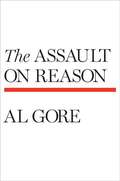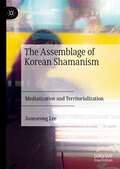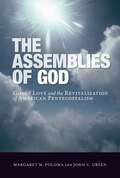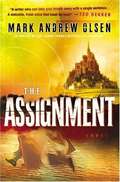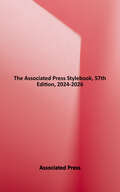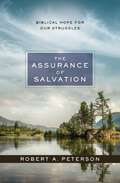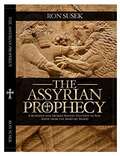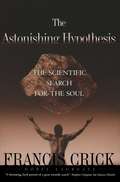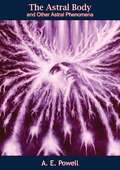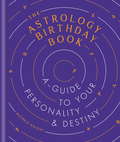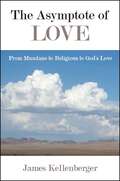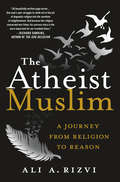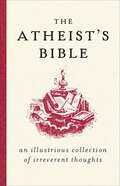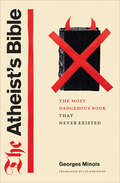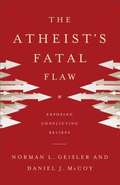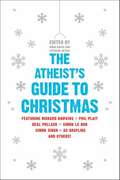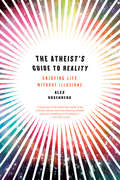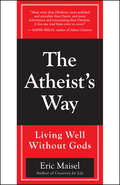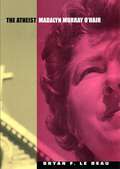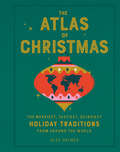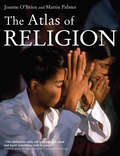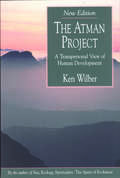- Table View
- List View
The Assault on Reason: How the Politics of Blind Faith Subvert Wise Decision-making
by Al GoreA visionary analysis of how the politics of fear, secrecy, cronyism, and blind faith have combined with the degradation of the public sphere to create an environment hostile to reason
The Assemblage of Korean Shamanism: Mediatization and Territorialization
by Joonseong LeeThe most unique aspect of Korean shamanism is its mysterious duality that continually reiterates the processes of deterritorialization and reterritorialization. This book approaches that puzzle of mysterious duality using an interdisciplinary lens. Korean shamanism has been under continuous oppression and marginalization for a long time, and that circumstance has never dissipated. Shaman culture can be found in every corner of people’s lives in contemporary Korea, but few acknowledge their indigenous beliefs with pride. This mysterious duality has deepened as the mediatization process of Korean shamanism has developed. Korean shamanism was revived as the dynamic of shamanic inheritance in the process, but these dynamics have also become the object of mockery. For this reason, any true understanding of Korean shamanism rests in how to unravel the unique puzzles of this mysterious duality. In this book, the duality is mapped out by playing with the puzzles surrounding the contextualization of Korean shamanism and mediatization.
The Assemblies of God: Godly Love and the Revitalization of American Pentecostalism
by Margaret M. Poloma John C. GreenThe Assemblies of God (AG) is the ninth largest American and the world’s largest Pentecostal denomination, with over 50 million followers worldwide. The AG embraces a worldview of miracles and mystery that makes“supernatural” experiences, such as speaking in tongues, healing, and prophecy, normal for Christian believers. Ever since it first organized in 1916, however, the “charismata” or “gifts of the Holy Spirit” have felt tension from institutional forces. Over the decades, vital charismatic experiences have been increasingly tamed by rituals, doctrine, and denominational structure. Yet the path towards institutionalization has not been clear-cut. New revivals and direct personal experience of God—the hallmarks of Pentecostalism—continue as an important part of the AG tradition, particularly in the growing number of ethnic congregations in the United States.The Assemblies of God draws on fresh, up-to-date research including quantitative surveys and interviews from twenty-two diverse Assemblies of God congregations to offer a new sociological portrait of the AG for the new millennium. The authors suggest that there is indeed a potential revitalization of the movement in the works within the context of the larger global Pentecostal upswing, and that this revitalization may be spurred by what the authors call “godly love:” the dynamic interaction between divine and human love that enlivens and expands benevolence.The volume provides a wealth of data about how the second-largest American Pentecostal denomination sees itself today, and suggests trends to illuminate where it is headed in the future.
The Assignment
by Mark Andrew Olsen[This quote is taken from the back cover of the book.] "Follow a disillusioned young priest, a terrified graduate student, and a spiritually fascinating man--from the shores of Normandy to the hills of Ireland, from the alleyways of Paris, Rome, and Jerusalem, to the halls of time itself--in a suspenseful thriller that combines the supernatural with unrelenting action, aching loss, and one life story that will sweep you to the very foot of Golgotha."
The Associated Press Stylebook, 57th Edition, 2024-2026
by Associated PressThe spiral-bound Associated Press Stylebook, 57th Edition, includes new chapters on artificial intelligence and criminal justice and a detailed self-editing checklist. Specialized chapters cover sports, business, punctuation, religion, data journalism, inclusive storytelling, health and science, news values, and polls and surveys.
The Assurance of Salvation: Biblical Hope for Our Struggles
by ZondervanFor years, Robert A. Peterson taught about the assurance of salvation in seminary and Sunday school classrooms. He was concerned, however, to find that some people who, for a variety of reasons, were unable to grasp the certainty of their salvation. The Assurance of Salvation identifies these "troublers" of assurance and provides the remedy to diffuse insecurity.Peterson asserts that difficult backgrounds and experiences, intellectual doubts, tender consciences, habitual sins, and overconfidence that people face are the enemies of assurance. Through a competent handling of the Bible, he explains that by embracing three gifts from God--His Word, His Spirit, and His work in our lives--those who struggle with insecurity are able to personally experience the freedom of God's assurance.
The Assyrian Prophecy
by Ron SusekA betrayed and broken nation destined to rise anew from the Martyr's blood.
The Astadhyayi of Panini Volume III
by J. A. F. Roodbergen S. D. JoshiTranslation in English of Indian history, religion and culture, volume 3.
The Astadhyayi of Panini Volume IV
by J. A. F. Roodbergen S. D. JoshiTranslation in English of Indian history, religion and culture, 4th volume.
The Astadhyayi of Panini Volume XIII
by J. A. F. Roodbergen S. D. JoshiTranslation in English of Indian history, religion and culture, volume 13.
The Astonishing Hypothesis: The Scientific Search for the Soul
by Francis CrickNobel Laureate Francis Crick boldly stradles the line between science and spirituality by examining the soul from the standpoint of a modern scientist.
The Astral Body and Other Astral Phenomena: And Other Astral Phenomena (Quest Book Ser.)
by A. E. PowellTHE purpose of this book is to present to the student of Theosophy a condensed synthesis of the information at present (1926) available concerning the Astral Body of man, together with a description and explanation of the astral world and its phenomena. The book is thus a natural sequel of The Etheric Double and Allied Phenomena published in 1925.As in the case of The Etheric Double, the compiler has consolidated the information obtained from a large number of books, a list of which is given, arranging the material, which covers a vast field and is exceedingly complex, as methodically as lay within his power. It is hoped that by this means present and future students of the subject will be saved much labour and research, being able not only to find the information they require presented in a comparatively small compass, but also, with the help of the marginal references, to refer, should they so desire, to the original sources of information.In order that the book may fulfil its purpose by being kept within reasonable dimensions, the general plan followed has been to expound the principles under-lying astral phenomena, omitting particular examples or instances. Lecturers and others who wish specific illustrations of the principles enunciated, will find the marginal references useful as a clue to the places where the examples they seek may be found.—A. E. Powell
The Astrology Birthday Book
by Michelle KnightEver wondered how your date of birth influences your personality, your loves and passions, and your path in life? The Astrology Birthday Book reveals how the precise alignment of the planets on your date of birth determines the characteristics that make you unique.
The Asymptote of Love: From Mundane to Religious to God's Love
by James KellenbergerIn The Asymptote of Love, James Kellenberger develops a theory of religious love that resists essentialist definitions of the term and brings into conversation historical debates on love in Western philosophy and Christian theology. He argues that if love can be likened to a mathematical asymptote, which is a straight line that infinitely approaches a curve but never quite reaches it, then the asymptote of love reaches toward the infinite endpoint of love at its uttermost, namely, God's love. Drawing upon a broad range of thinkers who have put forth classic debates on love—such as St. Augustine of Hippo, Anders Nygren, and St. Thomas Aquinas, as well as some lesser known figures in the debate, such as Leo Tolstoy and Albert Schweitzer—Kellenberger explains the profound connection between human agape and God's infinite love in its capacity to offer both directive guidance and to exist beyond human conception.
The Atheist Muslim: A Journey from Religion to Reason
by Ali A. RizviIn much of the Muslim world, religion is the central foundation upon which family, community, morality, and identity are built. The inextricable embedment of religion in Muslim culture has forced a new generation of non-believing Muslims to face the heavy costs of abandoning their parents' religion: disowned by their families, marginalized from their communities, imprisoned, or even sentenced to death by their governments. Struggling to reconcile the Muslim society he was living in as a scientist and physician and the religion he was being raised in, Ali A. Rizvi eventually loses his faith. Discovering that he is not alone, he moves to North America and promises to use his new freedom of speech to represent the voices that are usually quashed before reaching the mainstream media--the Atheist Muslim.In The Atheist Muslim, we follow Rizvi as he finds himself caught between two narrative voices he cannot relate to: extreme Islam and anti-Muslim bigotry in a post-9/11 world. The Atheist Muslim recounts the journey that allows Rizvi to criticize Islam--as one should be able to criticize any set of ideas--without demonizing his entire people. Emotionally and intellectually compelling, his personal story outlines the challenges of modern Islam and the factors that could help lead it toward a substantive, progressive reformation.
The Atheist's Bible: An Illustrious Collection of Irreverent Thoughts
by Joan KonnerA wise and witty collection of quips, quotes, and musings from the world’s greatest geniuses and jokers, proving that “all thinking men are atheists” (Ernest Hemingway)From Sophocles to Homer Simpson, The Atheist’s Bible celebrates the long and rich tradition of rejecting organized religion. Included here are insights and observations from scientists, writers, philosophers, and comedians throughout history who have questioned the wisdom (and sanity) of pious believers. Far from a cynical polemic, this “bible” shares the same joy, love of beauty, and human wonder that religious books of quotations provide, but with a healthy dose of independent thought and without dogma.
The Atheist's Bible: The Most Dangerous Book That Never Existed
by Georges MinoisThis intellectual history of a rumored book of heresy reveals a persistent undercurrent of atheism from the Middle Ages into the 18th century. In 1239, Pope Gregory IX accused Frederick II, the Holy Roman Emperor, of heresy. Without disclosing evidence of any kind, Gregory announced that Frederick had written a supremely blasphemous book—De tribus impostoribus, or the Treatise of the Three Impostors—in which Frederick denounced Moses, Jesus, and Muhammad as impostors. Of course, Frederick denied the charge, and over the following centuries the story played out across Europe, with libertines, freethinkers, and other &“strong minds&” seeking a copy of the scandalous text. The fascination persisted until finally, in the eighteenth century, someone brought the purported work into actual existence—in not one but two versions, Latin and French. Although historians have debated the origins and influences of this most apocryphal book, there has not been a comprehensive biography of the Treatise of the Three Impostors. In The Atheist&’s Bible, historian Georges Minois tracks the course of the book from its origins in 1239 to its most salient episodes in the seventeenth and eighteenth centuries, introducing readers to the colorful individuals obsessed with possessing the legendary work—and the equally obsessive passion of those who wanted to punish people who sought it. Minois&’s compelling account sheds much-needed light on the power of atheism, the threat of blasphemy, and the persistence of free thought during a time when the outspoken risked being burned at the stake. &“[A] timely and elegant study…Readers who are intrigued or scandalized by the diatribes of Richard Dawkins or Christopher Hitchens will discover in The Atheist&’s Bible that, as that other Bible says, there is nothing new under the sun.&”—Walter Stephens, author of Demon Lovers
The Atheist's Fatal Flaw: Exposing Conflicting Beliefs
by Norman L. Geisler Daniel J. MccoyMost critiques of atheism focus on refuting head-on the claims of atheists. Instead, this unique book faithfully represents what atheists say they believe and stands back to watch as the natural inconsistencies in that worldview inevitably rise to the surface. Norman L. Geisler, the apologetic giant of our time, is joined by Daniel J. McCoy, highlighting two inconsistencies in particular. First they examine the atheist's assertion that God cannot exist because there is evil in the world and that if God truly existed, he would intervene. These same people then turn around and say any intervention on God's part would impose upon human autonomy, and thus would be unjust. Second, these very interventions that would be considered immoral if imposed upon the earth by God are lauded when they stem instead from some human institution or authority. Geisler and McCoy highlight this kind of "doublethink" step by step, showing readers how to identify such inconsistencies in atheistic arguments and refute them--or rather show atheists how they refute themselves.
The Atheist's Guide to Christmas
by Robin Harvie and Stephanie MeyersThis funny, festive, and thoughtful collection delves into age-old holiday questions for the non-believer—like what do you get an atheist for Christmas?If you’re an atheist, you don’t believe in the three wise men, so this Christmas, we bring you not three, but forty-two wise men and women, bearing gifts of comedy, science, philosophy, the arts, and knowledge. What does it feel like to be born on Christmas day? How can you most effectively use lights to make your house visible from space? And where can you listen to the echoes of the Big Bang on December 25? The Atheist’s Guide to Christmas answers all these questions and more:Richard Dawkins tells an original Christmas story.Phil Plait fact-checks the Star of Bethlehem.Neal Pollack teaches his family a lesson on holiday spirit.Simon Singh offers a very special scientific experiment.Simon le Bon loses his faith (but keeps church music).AC Grayling explains how to have a truly happy Christmas.Plus thirty-six other brilliant, funny, free-thinking pieces perfect for anyone who doesn’t think of holidays as holy days.
The Atheist's Guide to Reality: Enjoying Life without Illusions
by Alex RosenbergA book for nonbelievers who embrace the reality-driven life. We can't avoid the persistent questions about the meaning of life-and the nature of reality. Philosopher Alex Rosenberg maintains that science is the only thing that can really answer them--all of them. His bracing and ultimately upbeat book takes physics seriously as the complete description of reality and accepts all its consequences. He shows how physics makes Darwinian natural selection the only way life can emerge, and how that deprives nature of purpose, and human action of meaning, while it exposes conscious illusions such as free will and the self. The science that makes us nonbelievers provides the insight into the real difference between right and wrong, the nature of the mind, even the direction of human history. The Atheist's Guide to Reality draws powerful implications for the ethical and political issues that roil contemporary life. The result is nice nihilism, a surprisingly sanguine perspective atheists can happily embrace.
The Atheist's Way: Living Well Without Gods
by Eric MaiselIn The Atheist’s Way, Eric Maisel teaches you how to make rich personal meaning despite the absence of beneficent gods and the indifference of the universe to human concerns. Exploding the myth that there is any meaning to find or to seek, Dr. Maisel explains why the paradigm shift from seeking meaning to making meaning is this century’s most pressing intellectual goal.
The Atheist: Madalyn Murray O'Hair
by Bryan F. BeauThe first biography of the colorful life Madalyn Murray O'Hair—America's most famous (and despised) atheistIn 1964, Life magazine called Madalyn Murray O’Hair “the most hated woman in America.” Another critic described her as “rude, impertinent, blasphemous, a destroyer not only of beliefs but of esteemed values.”In this first full-length biography, Bryan F. Le Beau offers a penetrating assessment of O’Hair’s beliefs and actions and a probing discussion of how she came to represent both what Americans hated in their enemies and feared in themselves. Born in 1919, O’Hair was a divorced mother of two children born out of wedlock. She launched a crusade against God, often using foul language as she became adept at shocking people and making effective use of the media in delivering her message. She first gained notoriety as one of the primary litigants in the 1963 case Murray v. Curlett which led the Supreme Court to ban school prayer. The decision stunned a nation engaged in fighting “godless Communism” and made O’Hair America’s most famous—and most despised—atheist. O’Hair led a colorful life, facing assault charges and extradition from Mexico, as well as the defection of her son William, who as an adult denounced her. She later served as Hustler publisher Larry Flynt’s chief speech writer in his bid for President of the United States.Drawing on original research, O’Hair’s diaries, and interviews, Le Beau traces her development from a child of the Depression to the dictatorial, abrasive woman who founded the American Atheists, wrote books denouncing religion, and challenged the words “Under God” in the Pledge of Allegiance, “In God We Trust” on American currency, the tax exempt status of religious organizations, and other activities she saw as violating the separation of church and state.O’Hair remained a spokesperson for atheism until 1995, when she and her son and granddaughter vanished. It was later discovered that they were murdered by O’Hair’s former office manager and an accomplice.Fast-paced, engagingly written, and sharply relevant to ongoing debates about school prayer and other religious issues, The Atheist tells the colorful life-story of a woman who challenged America’s most deeply held beliefs.
The Atlas of Christmas: The Merriest, Tastiest, Quirkiest Holiday Traditions from Around the World
by Alex PalmerDiscover the fascinating (and sometimes downright odd!) ways that people and nations celebrate the holiday season and share this festive compendium's unique traditions together with family and friends.Do you know that in Guatemala there's a "Burn the Devil" tradition to kick off the Christmas season, where revelers gather to set fire to devil-piñatas? In Sweden, a popular figure in Christmas traditions is the Yule Goat, a rowdy, menacing character who demands gifts. And in Japan, a big bucket of Kentucky Fried Chicken has become the classic Christmas Day feast. These and many other global Christmas traditions are featured here in this delightful book. From decorations and activities to feasts and special treats, there's a wide range of both lovely and unusual traditions from around the globe.
The Atlas of Religion
by Joanne O'Brien Martin PalmerThe world's religions have emerged as one of the greatest geopolitical forces now shaping our lives. Now available in an updated edition, this authoritative atlas is an essential resource for understanding the powerful role of religion around the globe. In an accessible text packed with information, it maps the current nature, extent, and influence of each of the major religions and shows, country by country, how religions are spread through broadcasting, missionary work, schooling, and banking; how they relate to government, laws, and world hunger; and the role they play in wars. It traces the emergence of new religious movements, the survival of traditional beliefs, and the presence of atheism and agnosticism. The Atlas of Religion also locates the origin, the heartland, and the sacred places of each of the major religions and provides essential background with a valuable table showing the fundamental beliefs of Buddhism, Christianity, Hinduism, Islam, Judaism, Sikhism, and Taoism. Copub: Myriad Editions Limited
The Atman Project
by Ken WilberWilber traces human development from infancy into adulthood and beyond, into those states described by mystics and spiritual adepts. The spiritual evolution of such extraordinary individuals as the Buddha and Jesus hints at the direction human beings will take in their continuing growth toward transcendence.
